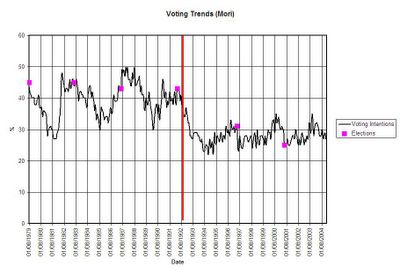Apparently this is the real reason why the Tories won't win the next election: they have not been trusted with running the country since Black Wednesday. One hates to be so reductionist about all of this, but I threw together a basic graph based on tables over at Mori. And all as I can say is: wow! The red line marks Black Wednesday and, though the polls go up and down as one might expect, there does seem to be a marked change from 1992:

There's a graph showing preferences for all parties over on Mori's site. As this graph and the ones on Mori suggest, Labour victories may not be so much a function of Tony Blair (John Smith would almost certainly have won in 1997), but rather they are a function of Tory weakness. I'm less than convinced that Labour, as it is now, could compete with a functioning Conservative Party. They'll live to regret not introducing PR.
Of course, I don't mean that people won't return to the Tories because of Black Wednesday, but that their reputation was irreparably damaged then and hasn't recovered. I'm not quite sure what they would have to do to bring the voters back. That said, I suspect that Howard is not quite sure about this either. If he resigns after the next election, I wonder who'll replace him? Maybe Oliver Letwin, who seems supremely competent.
But perhaps there's a more pervasive problem, that either Black Wednesday or electoral weakness exposed, which is the dual division in the party, over Europe and over the role of markets in society. Now, Labour is sorely divided too, but success and power tend to concentrate minds, at least for a while. Repairing this damage, and returning to the centre ground, seem like an almost impossible, and thankless task, for whoever takes it on.
No comments:
Post a Comment